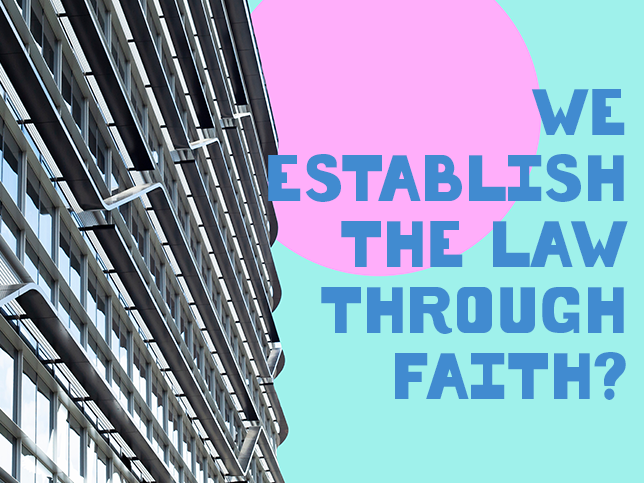by Grant Hawley
If one thing stands out about the Apostle Paul’s letters, it’s that he wants his readers to know about their freedom in Christ. “You are not under law, but under grace” (Rom 6:14b), “It was for freedom that Christ set us free; therefore keep standing firm and do not be subject again to a yoke of slavery” (Gal 5:1), and “But if you are led by the Spirit, you are not under the Law” (Gal 5:18) are just a few of Paul’s many strong statements about the Christian’s freedom.
If that’s true, what does Paul mean when he writes, “Do we then nullify the Law through faith? May it never be! On the contrary, we establish the Law.” in Romans 3:31? When out of context, this statement does seem to suggest something that goes against all of Paul’s many statements about the Christian’s freedom. How can Christ be the end of the law (Rom 10:4) and it also be true that we also “establish the law” through faith in Him?
Let’s look at the context. Just before this section of text (Rom 3:21-31), we have a discussion about how the Old Testament shows that no one can be justified by the works of the law because the OT itself insists that everyone is guilty (3:9-20). Following our passage in Rom 3:21-31, we have chapter 4, which is a discussion about how the Old Testament shows that justification is by faith apart from works. Paul uses Abraham and David as illustrations of this principle.
Besides looking at a verse in context, it can often be helpful to recognize the literary structure of the passage we’re studying. Paul used an interesting structure called “chiasm” when he wrote Romans 3:21 to 3:31. When we map it out, the passage looks like this:
A. But now apart from the Law the righteousness of God has been manifested, being witnessed by the Law and the Prophets,
B. even the righteousness of God through faith in Jesus Christ for all those who believe; for there is no distinction;
C. for all have sinned and fall short of the glory of God,
D. being justified as a gift by His grace through the redemption which is in Christ Jesus;
E. whom God displayed publicly as a propitiation in His blood through faith.
F. This was to demonstrate His righteousness, because in the forbearance of God He passed over the sins previously committed;
F. for the demonstration, I say, of His righteousness at the present time,
E’. so that He would be just and the justifier of the one who has faith in Jesus.
D’. Where then is boasting? It is excluded. By what kind of law? Of works? No, but by a law of faith.
C’. For we maintain that a man is justified by faith apart from works of the Law.
B’. Or is God the God of Jews only? Is He not the God of Gentiles also? Yes, of Gentiles also, since indeed God who will justify the circumcised by faith and the uncircumcised through faith is one.
A’. Do we then nullify the Law through faith? May it never be! On the contrary, we establish the Law.
Here, the first and last line (A and A’) are parallel, so are B and B’, C and C’, etc. This helps us tremendously with our question. Verse 31, “Do we then nullify the Law through faith? May it never be! On the contrary, we establish the Law” parallels verse 21, “But now apart from the Law the righteousness of God has been manifested, being witnessed by the Law and the Prophets.” This shows us that Paul is using the term “the Law” to refer to the Old Testament Scripture, “the Law and the Prophets,” not specifically the requirements of the Law of Moses. When Paul writes, “On the contrary, we establish the Law,” what he means is that righteousness by faith apart from the works of the Law is exactly what the Old Testament teaches.
This is also what we would expect from the context, since Paul established through the Old Testament that no one can be justified by the law in 3:9-20 and used illustrations from the great patriarchs Abraham and David to show that righteousness is by grace through faith in chapter 4. The validity of the Old Testament is upheld by teaching justification by grace through faith.
So, Paul doesn’t contradict himself. The Christian really is free from the Law and righteousness is and always has been by grace through faith apart from the works of the Law. The Old Testament itself establishes this fact. By holding fast to our freedom from the Law that Christ purchased for us with His own blood, we honor the Law.
There is an amazing opportunity to bring God's Word to many people all over the world And to train hundreds or even thousands of indigenous people to do the same. If you'd like to be a part of it, you can learn more and become a parner here.
